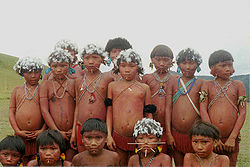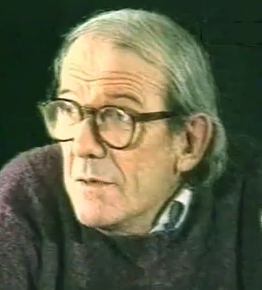Towards a
Latin American Indigenous Philosophy



Is there any such thing as a Latin
American indigenous philosophy? If one regards philosophy as a worldview,
lifestyle or mindset, it is certainly the case that all Latin American indigenous
peoples have their own respective sets of beliefs about the cosmos, life, and
death. And yet anthropological, historical, and empirical descriptions of
particular cultures, social worlds, common practices, myths and beliefs do not
seem to count as philosophical accounts of "philosophy," which seem
to presuppose critical inquiry, reflexivity, and impartiality, even if not
necessarily understood in analytic, systematic or universalist terms.
In effect, it is my guiding thesis and original intuition here that Latin American Philosophy is better properly understood as Non-Western Philosophy, that is, insofar as it succeeds in rescuing the characteristically Latin American features of the highly complex, subtle combinations of Latin American Indigenous Thought and Afro-Latin American Philosophy with European nomadic thinking, reflecting the ongoing flux of Asiatic migrations, African and Semitic Diasporas which ultimately make Latin American Philosophy unique. I hope thus to contribute towards a rehabilitation of a Liberation Philosophy that takes the cultural, pragmatist turn of Critical Theory and Cultural Studies seriously.
In order
to avoid both provincial, naive simplifications and Eurocentric, chauvinistic impositions, we must
recast the question whether a Latin American indigenous thought is or could be
philosophical in light of genuine, autochthonous accounts –whenever these are
available— and historical, cultural narratives that have been preserved throughout
the times by travelers, naturalists, and others who attempted to inquire into
the nature of "the savage mind," to paraphrase Claude Lévi-Strauss.
Precisely because one must start from the fact of "cultural
relativism" and avoid by all means every racist, supremacist dismissal of
mythical thoughts and cultures as "inferior" or "primitive,"
we will be exploring in this course some of the different conceptions of nature,
human existence, religious, social, and political experiences of indigenous
peoples of Latin America. By contrasting a "testimonial epistemology"
of first-person accounts with third-person narratives of an "observational
epistemology," we will try to make sense of Latin American identities
following the destruction of the highly complex Mesoamerican civilizations of the
Maya and Aztec and of the Andean Inca empire in the pre-Columbian era, as most
South American indigenous peoples have been nomadic and have not developed a
writing system, mathematics or sophisticated technologies. The history of Latin
American indigenous peoples can be divided into 4 major periods, namely:
Pre-Columbian (i.e., prior to the "discovery" of the Americas), the
Conquest (16th century up to the expulsion of the Jesuits from Brazil in 1760),
the Post-Jesuit Defeat of the Indians (1760-1910), and Contemporary Indigenous
Movements (20th and 21st centuries). By revisiting some of these historical
developments in different regions of the subcontinent, we will be challenged to
ponder that, in spite of the
killings of tens of millions of Amerindians brought about by their dramatic,
traumatic encounter with Iberian and other European colonizers and travelers,
the survival of Latin American indigenous peoples today remains decisive for
the preservation of autochthonous cultures, for the
consolidation of racially
mixed identities, and for the very possibility of a coherent Latin American
philosophy.
Nita's Class Presentation at Kennesaw (Feb. 24, 2011)
Latin American Philosophy
African-American Philosophy of Liberation
Tentative Schedule ( Reading Excerpts from Major Works)
Week 1: Is there a Latin American
indigenous philosophy?
Medina, Vicente. "The Possibility of an Indigenous Philosophy: A Latin American Perspective," American Philosophical Quarterly, Vol. 29, No. 4 (Oct., 1992): p. 373-380.
Maffie, James. "Pre-Columbian Philosophies," in Nuccetelli, Susana, Ofelia Schutte, and Otávio Bueno (eds).
2010. A Companion to Latin
American Philosophy. Wiley-Blackwell, p.
9-22.
Week 2: The Conquest and the Destruction
of the Indies
Monteiro, John. "The Crises and Transformation of Invaded
Societies," in The Cambridge History
of the Native Peoples of the Americas, Volume 3: South America, edited by
Frank Salomon, Stuart B. Schwartz. Cambridge University Press, 1999, p. 973-1024.
Caminha, Pero Vaz de. "Letter to King Manuel [1500]," in The voyage of Pedro Álvares Cabral to Brazil and India, ed. William Brooks. Asian Educational Services, 1995.
Las Casas, Bartolomé de. Witness: Writings of Bartolomé de las Casas. Ed. George Sanderlin. Maryknoll, NY: Orbis Books, 1992. [1552]
Week 3: Cannibalism and the Exotic
Other
Staden, Hans. Hans Staden's true history: an account of cannibal captivity in Brazil, edited and translated by Neil L. Whitehead and Michael Harbsmeier. Duke University Press, 2008.[1557]
Léry, Jean de. History of a Voyage to the Land of Brazil,
Also Called America. Trans. Janet Whatley. University of California Press, 1993. [1578]
Montaigne, Michel de. Essais I xxx, II xviii, in The Complete Essays of Montaigne, trans. Donald Frame. Stanford University Press, 1958. [1580]
Week 4: Anthropophagy and Cultural Identity in the Tropics
Film: "Hans Staden" (1999, spoken in the Tupi indigenous language with subtitles in English, about his captivity among the Tupinamba in the 16th century)
Stam, Robert. Tropical Multiculturalism: A Comparative History of Race in Brazilian Cinema and Culture. Duke University Press, 1997. Chapter 9: From Auto-Critique to Anthropophagy (1964-1971).
Week 5: Latin American Indian Wars
Guaman Poma de Ayala, Felipe. El Primer Nueva Corónica y Buen Gobierno (The First New Chronicle and Good Government). Hackett Publishing, abridged edition, 2006. [1615]
Film: "Brave New Land" (2000, conflicts of Portuguese and indigenous peoples in Brazil)
Week 6: From Just Wars to Social
Utopias
Film: "The Mission" (1986, Jesuit Reduction among the Guarani in 18th-century South America)
Wachtel, Nathan. The vision of the vanquished: the Spanish conquest of Peru through Indian eyes, 1530-1570. University of Wisconsin Press, 1993.
Week 7: The Survival of Latin
American Indigenous Peoples
Hemming, John. Die If You Must: Brazilian Indians in the Twentieth Century. New York: Pan Macmillan, 2003.
Lucero, José Antonio. Struggles of Voice: The Politics of Indigenous Representation in the Andes. (Pitt Latin American Studies). University of Pittsburgh Press, 2008.
Week 8: A Latin
American Philosophical Anthropology
Rabben, Linda. Brazil's Indians and the onslaught of civilization: The Yanomami and the Kayapó. Seattle: University of Washington Press, 2004.
Film: "Warriors of the Amazon" (1996, about the Yanomami)
Week 9: Testimonial Latin American
Indigenous Philosophy
Barrios de Chungara, Domitila. Let Me Speak! Testimony of Domitila, a Woman of the Bolivian Mines. Monthly Review Press, 1979.
Menchú, Rigoberta. I, Rigoberta Menchu: An Indian Woman in Guatemala. London: Verso, 1984.
Week 10: A Latin American
Indigenous Philosophy of Human Rights
Film: "When the Mountains Tremble" (1983; about the war between the Guatemalan Military and the Mayan Indian population)
Canteñs, Bernardo J. "The Rights of the American Indians," in Nuccetelli, Susana, Ofelia Schutte, and Otávio Bueno (eds). 2010. A Companion to Latin American Philosophy. Wiley-Blackwell, p. 23-35.
FURTHER
READING
Borofsky, Robert and Bruce Albert. Yanomami: the fierce controversy and what we can learn from it. University of California Press, 2005.
Everett, Daniel L. Don’t Sleep, There are Jaguars: Life and Language in the Amazonian
Jungle. Vintage Books, 2009.
Garfield, Seth. Indigenous struggle at the heart of Brazil. Duke University Press, 2001.
Hemming, John. The Conquest of the Incas. New York: Harcourt Brace Jovanovich, 1970.
Hemming, John. Red Gold: The Conquest
of the Brazilian Indians. London: Papermac,
1996. [1978].
Holbraad, Martin. "Defining Anthropological Truth"
Leon-Portilla, Miguel, and Gary Gossen (eds). South and Mesoamerican Spirituality: From the Cult of the Feathered Serpent to the Theology of Liberation. New York: Crossroads, 1993.
Lévi-Strauss, Claude. The savage mind. University of Chicago Press, 1966.
Claude Lévi-Strauss, "Race, histoire et culture" (Unesco, 1996) [1952]
Lévi-Strauss, Claude. Tristes Tropiques. Atheneum, 1973.[1962]
Maffie, James. "Aztec Philosophy," in The Internet Encyclopedia of Philosophy
Mignolo, Walter. The Geopolitics of Knowledge and the Colonial Difference. South Atlantic Quarterly 101 (2002): p. 57-96.
Pratt, Mary Louise. Imperial Eyes: Travel Writing
and Transculturation. New York: Routledge, 1992.
Viveiros de Castro, Eduardo Batalha. From the enemy's point of view: Humanity and divinity in an Amazonian society. University of Chicago Press, 1992.
Viveiros de Castro, Eduardo. "The Nazis and the Amazonians, but then again, Zeno" (On Comparative Relativism and Social Anthropology)
Viveiros de Castro, Eduardo. "Perspectival anthropology and the method of controlled equivocation" (On Perspectivism as a Method for an Amazonian Indigenous Philosophy)
Warren, Jonathan W. Racial revolutions: antiracism and Indian resurgence in Brazil. Duke University Press, 2001. Chapters 5 and 6.
Warren, Kay B. and Jean Elizabeth Jackson. Indigenous movements, self-representation, and the state in Latin America. University of Texas Press, 2002.
Zack, Naomi. Race and Mixed Race. Philadelphia: Temple University Press, 1993.
Zack, Naomi. Philosophy of Science and Race. New York: Routledge, 2002.
Related Links:
Justin Smith, "What Is 'Non-Western' Philosophy?" (3 Quarks Daily)
YouTube: Indios do Brasil
YouTube: Indios Tupi-Guaranis
Afro-Native Pop Art: Rita Ribeiro's "Tecnomacumba"
Afro-Native Pop Art: Rita Ribeiro, "Cabocla Jurema"
YouTube: Native Visions - Chirapaq - Honor and Tribute to Indigenous of South America
YouTube: Film Directors Diary, The Enemy God - Yanomami
YouTube: Y Ikatu Xingu – Gisele Bündchen in Xingu village
YouTube: Archive of the Indigenous Languages of Latin America
YouTube: James Cockcroft - Indigenous and Human Rights in Latin America
The Enemy God – The Movie
Wiki entry on Latin America
Wiki entry on Hispanic and Latino Americans
Wiki entry on Immigration
Wiki entry on Indigenous peoples of the Americas
A Latin America Philosophy of Race: Recasting Liberation, Phenomenology and Critical Theory
Eduardo Viveiros de Castro, "Intensive filiation and demonic alliance" (On Deleuze and Anthropology)
Entrevista com Viveiros de Castro (Estado de S. Paulo, 2008)
Indigenous Peoples: Issues and Resources
Google Books: A Companion to Latin American Philosophy
COICA Amazonian Portal
Human Rights in the Amazon (Brazilian NGO)
Wiki entry on Mestizaje
World Social Forum
Adital: Noticias de América Latina y Caribe
The Internet Encyclopedia of Philosophy: Ethics
Stanford Encyclopedia of Philosophy: Affirmative Action
Centre for Applied Philosophy and Public Ethics
Markkula Center for Applied Ethics
Carnegie Council for Ethics in International Affairs
PHIL 3750 Social and Political Philosophy
REL 1220-011 WORLD RELIGIONS and GLOBALIZATION
Critical Theory Seminar: Habermas and Honneth
Liberation Seminar: Latin American Theology and Political Philosophy
In God's Name: Reformed, Catholic, Jewish

|








